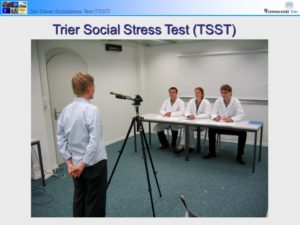By John M. de Castro, Ph.D.
“You can’t judge yourself or worry about what the other person is thinking if you’re too busy experiencing the wonder of the here and now.” – Jonathan Hinek
Humans are social creatures. All that the species has accomplished resulted from its ability to work together and build upon the work of others. Social connections are crucial to our health and happiness. Hence, it is very important for the individual to have effective satisfying social relationships. Unfortunately, interacting with other people is extremely complex and many find it very difficult to effectively engage with others. It is a common human phenomenon that being in a social situation can be stressful and anxiety producing. This is particularly true when asked to perform in a social context such as giving a speech. In fact, research has demonstrated that people are more afraid of public speaking than they are of death.
Mindfulness in general appears to improve social relationships. In today’s Research News article “Trait Mindfulness Modulates Neuroendocrine and Affective Responses to Social Evaluative Threat.” (See summary below or view the full text of the study at: https://www.ncbi.nlm.nih.gov/pmc/articles/PMC5087919/ ), Brown and colleagues investigate the relationship of mindfulness with social anxiety. They recruited college students and randomly assigned them to either a social anxiety or control condition. The students performed a Trier Social Stress Test involving preparing and giving a 5-minute speech and doing simple math either in front of critical peer evaluators (social anxiety) or alone (control). Before and after the test the students provided saliva samples to assess cortisol levels, an indicator of stress. They were also measured for anxiety, negative emotions, fear of evaluation, and mindfulness.
They found that the social anxiety manipulation compared to the control condition produced a significant elevation of salivary cortisol and anxiety. But, mindfulness moderated the effects such that students high in mindfulness had significantly lower anxiety, negative emotions, and cortisol responses to the social anxiety test than students low in mindfulness. This was true even when the students’ levels of fear of evaluation were controlled for. On the other hand, there were no significant effects of mindfulness in the control condition. So, the mindfulness effects were only with social anxiety.
These results suggest that mindfulness buffers the response to social stress and is associated with lower levels of stress hormones and negative emotions when exposed to social evaluative stress. These results, however, are correlational. So, causation cannot be determined within this study. But other research has demonstrated that mindfulness produces lower levels of stress, negative emotions, and anxiety and better social performance. So, it is likely that the results from the present study are indicative of mindfulness lowering social anxiety.
So, reduce responsiveness to social evaluative threat with mindfulness.
“Mindfulness meditation starts with observing an experience without trying to change or control it. It’s a practice in accepting reality and minimizing your resistance to it. This means to stop judging social interactions with negative adjectives, such as, scary, intimidating, uncomfortable, embarrassing, and so on.” – Adam Rockman
CMCS – Center for Mindfulness and Contemplative Studies
This and other Contemplative Studies posts are also available on Google+ https://plus.google.com/106784388191201299496/posts and on Twitter @MindfulResearch
Study Summary
Brown, K. W., Weinstein, N., & Creswell, J. D. (2012). Trait Mindfulness Modulates Neuroendocrine and Affective Responses to Social Evaluative Threat. Psychoneuroendocrinology, 37(12), 2037–2041. http://doi.org/10.1016/j.psyneuen.2012.04.003
Abstract
Background
Individual differences in mindfulness have been associated with numerous self-report indicators of stress, but research has not examined how mindfulness may buffer neuroendocrine and psychological stress responses under controlled laboratory conditions. The present study investigated the role of trait mindfulness in buffering cortisol and affective responses to a social evaluative stress challenge versus a control task.
Methods
Participants completed measures of trait mindfulness, perceived stress, anxiety, and fear of negative evaluation before being randomized to complete the Trier Social Stress Test (TSST; Kirschbaum et al., 1993) or a control task. At points throughout the session, participants provided five saliva samples to assess cortisol response patterns, and completed four self-report measures of anxiety and negative affect to assess psychological responses.
Results
In accord with hypotheses, higher trait mindfulness predicted lower cortisol responses to the TSST, relative to the control task, as well as lower anxiety and negative affect. These relations remained significant when controlling for the role of other variables that predicted cortisol and affective responses.
Conclusions
The findings suggest that trait mindfulness modulates cortisol and affective responses to an acute social stressor. Further research is needed to understand the neural pathways through which mindfulness impacts these responses.
